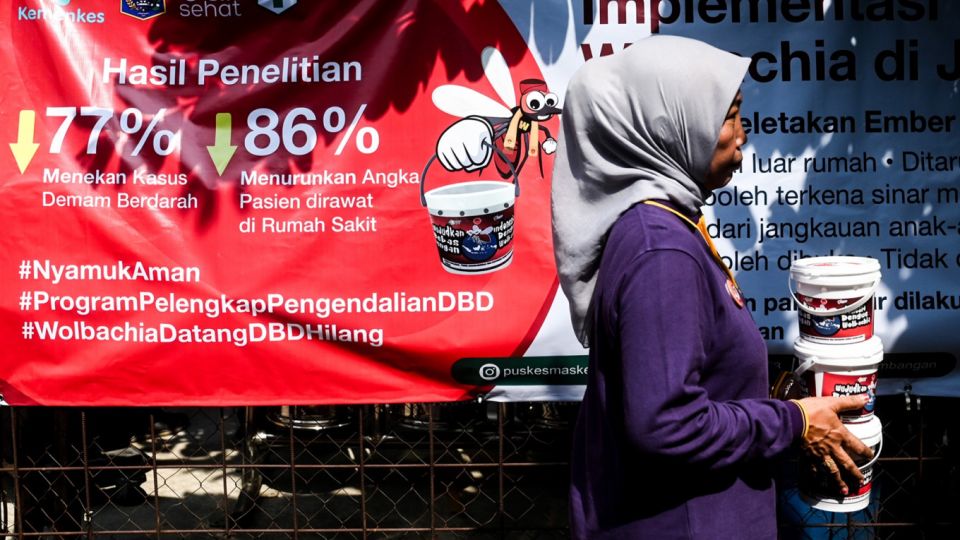October 7, 2024
JAKARTA – As health authorities release Wolbachia-infected mosquito eggs in West Jakarta as an effort to curb dengue, experts have reasserted the safety of the relatively new technology, noting that available studies show it poses little to no risk to either humans or the environment.
On Friday, the Jakarta administration launched the program to release thousands of mosquito larva infected with the Wolbachia bacteria in Kembangan district, West Jakarta. Nearly 1,200 households were selected to be given buckets filled with the eggs and larva and make sure they hatch into adult mosquitoes.
Wolbachia is a bacterium found in 60 percent of insect species, but not in Aedes aegypti, the mosquito species known as the vector of dengue fever. When these mosquitoes are infected with Wolbachia, the bacterium weakens the dengue virus, thereby reducing the mosquitoes’ ability to transmit the disease to humans.
When a male mosquito infected with Wolbachia mates with noninfected females, the eggs produced do not hatch. If either the female, or both the male and female, carry Wolbachia, their larva will also carry the microorganism, resulting in adult mosquitoes that are inhibited from spreading the dengue virus.
Kembangan was selected for the project due to its high record of dengue cases, with 54.1 cases per 100,000 people in 2023, according to the Jakarta Health Agency. West Jakarta also recorded the highest number of dengue patients with 799 cases in April, before decreasing to a double digit figure by September.
“The Kembangan district has a high population density. Residents across the district are known to work together, so principally, they are open to the plan to release the Wolbachia-infected Aedes aegypti mosquitoes,” said West Jakarta Mayor Uus Kuswanto in a statement issued on Friday.
Kembangan is one of five regions selected in a pilot project initiated by the Health Ministry. The project aims to release Wolbachia-infected mosquitoes to see its efficacy in controlling dengue transmission in real life settings.
Mounting oppositions
Previous studies and trials, including one conducted in Yogyakarta by researchers from Gadjah Mada University (UGM), showed that such technology could reduce dengue cases by 77 percent. It can also reduce hospitalizations of dengue patients by 86 percent, the same trial showed.
Read also: Govt insists on releasing Wolbachia mosquitoes in dengue fight despite Bali protests
However, the plan was met with some resistance by the public. The opposition was mainly fueled by claims that the lab-bred mosquitoes may cause adverse effects on humans and the environment.
Among claims recently circulated among residents and on social media was that the Wolbachia bacteria may increase a chronic and fatal heartworm disease among dogs and cats. Such claims cited studies which suggest that the bacterium was detected in Dirofilaria immitis, the parasite causing canine and feline heartworm disease that is transmitted to cats and dogs through mosquito bites.
The claim has been refuted in a study published in Scientific Report in September, which found that Wolbachia did not affect the capacity of an Aedes aegypti mosquito to transmit the worm. The study authors also suggested that the worm infection in Aedes aegypti mosquitoes would not interfere with the Wolbachia dengue control strategy.
“The widely circulating worm medicine for cats and dogs is more than effective to kill the heartworm,” said Wahyu Hidayat, a doctoral candidate in veterinary medicine at the Niigata University in Japan.
Public resistance against the Wolbachia technology to control dengue transmission is among the challenges calculated by an expert panel formed by the Health Ministry when deliberating about the pilot project in five regions across the country.
Read also: Ministry releases modified mosquitoes to curb dengue fever
The panel, composed of 25 researchers from various fields ranging from virology, entomology and social-economy, assessed the available research to determine the risks posed by spreading the Wolbachia-infected mosquitoes. They concluded the risks were minimal and can be ignored, according to Riris Andono Ahmad of the UGM Center for Tropical Medicine.
“We acknowledge the various challenges around this project, including people making claims that are not based on scientific evidence,” he said.
“Based on the scientific estimation of the expert panel, we found no significant risks that must be mitigated from the use of the technology.”
Political concerns
Riris noted that the Jakarta gubernatorial election in November could impact the pilot project in Kembangan.
Read also: Campaign gets off to an early start in Jakarta gubernatorial race
Dharma Pongrekun, a retired police general who has been vocal in opposing the Wolbachia project, is running for the governor’s seat. In past years, he was known for publishing claims that the technology may increase the mosquito population and lead to the spread of other mosquito-borne illnesses.
When asked by reporters recently about his opinion on the mosquito release in Kembangan, the independent candidate said that it was against “human nature” as mosquitoes should be killed or captured, rather than released into the wild. He also warned people against the potential adverse effects of the program.
But Riris claimed that health authorities had been preparing for such challenges.
“We’ll communicate openly about every aspect of the technology and listen to what the people need in relation to the program.”


